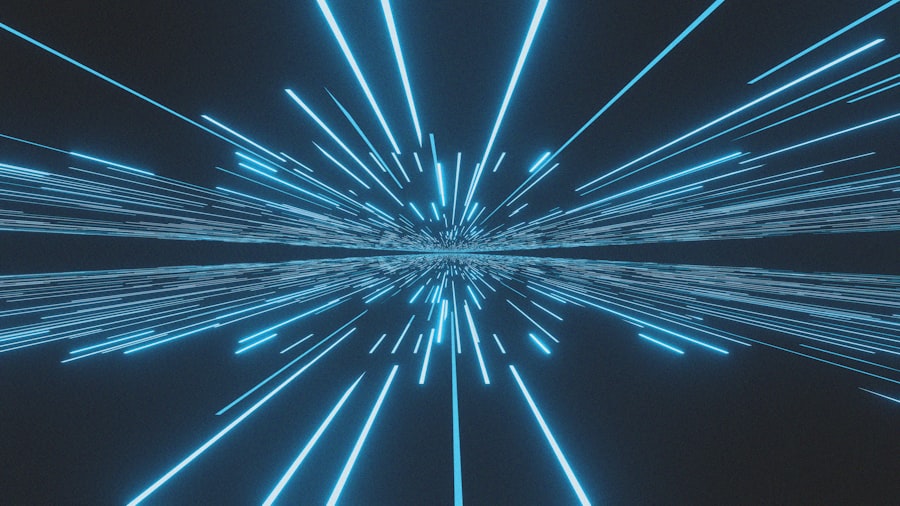The concept of time has long been a subject of fascination and debate within the realm of physics. It is a fundamental aspect of human experience, yet its nature remains elusive and complex. Time is often perceived as a linear progression from past to present to future, a framework that seems intuitive in everyday life.
However, when examined through the lens of physics, time reveals itself to be a multifaceted enigma that challenges our understanding of the universe. The problem of time encompasses various dimensions, from its measurement and perception to its role in the fundamental laws governing the cosmos. As physicists delve deeper into the intricacies of time, they encounter a myriad of questions that defy simple answers.
Is time an absolute entity, or is it relative and dependent on the observer? How does time interact with space, matter, and energy? These inquiries not only probe the foundations of physical theory but also touch upon philosophical considerations that have persisted for centuries.
The exploration of time in physics is not merely an academic pursuit; it has profound implications for how humanity perceives reality itself.
Key Takeaways
- Time is understood differently across classical physics, quantum mechanics, and relativity, leading to fundamental conflicts.
- The arrow of time is closely linked to entropy, explaining the directionality of time in thermodynamics.
- Quantum gravity attempts to reconcile the discrepancies in time’s nature between quantum mechanics and general relativity.
- Various approaches aim to resolve the problem of time, including new theoretical frameworks and philosophical perspectives.
- The quest for a unified theory of time remains central to advancing our understanding of the universe and its fundamental laws.
The Concept of Time in Classical Physics
In classical physics, time is often treated as a constant and uniform backdrop against which events unfold. Sir Isaac Newton famously described time as an absolute entity, flowing uniformly regardless of the circumstances surrounding it. This perspective allowed for the development of classical mechanics, where time serves as a parameter that facilitates the prediction of motion and the behavior of physical systems.
In this framework, time is measured in discrete units, such as seconds or hours, providing a reliable means to quantify change and movement. However, while classical physics offers a straightforward approach to time, it also presents limitations. The assumption of absolute time fails to account for the complexities observed in real-world phenomena.
For instance, the synchronization of clocks in different locations can lead to discrepancies due to variations in gravitational fields and relative motion. This realization prompted physicists to reconsider the nature of time, paving the way for more nuanced theories that would challenge Newtonian concepts and explore the interplay between time and other dimensions.
The Challenge of Time in Quantum Mechanics

The advent of quantum mechanics introduced a radical shift in the understanding of time, presenting challenges that classical physics could not adequately address. In the quantum realm, particles do not adhere to deterministic paths; instead, they exist in a state of probability until measured. This inherent uncertainty raises questions about the role of time in quantum processes.
Unlike classical systems, where time is a continuous parameter, quantum mechanics suggests that time may not be as straightforward as previously thought. One of the most perplexing aspects of time in quantum mechanics is its relationship with causality. In classical physics, cause precedes effect in a linear fashion; however, quantum phenomena can exhibit behaviors that seem to defy this principle.
For example, entangled particles can influence each other instantaneously over vast distances, challenging traditional notions of temporal order. This has led physicists to explore alternative interpretations of time within quantum frameworks, including the possibility that time itself may emerge from more fundamental processes rather than being an intrinsic feature of reality.
Time and the Theory of Relativity
| Concept | Description | Key Metric/Value | Unit |
|---|---|---|---|
| Speed of Light (c) | Constant speed at which light travels in vacuum | 299,792,458 | meters per second (m/s) |
| Time Dilation Factor (γ) | Factor by which time dilates for a moving observer | γ = 1 / √(1 – v²/c²) | Dimensionless |
| Proper Time (Δτ) | Time interval measured by a clock moving with the object | Varies depending on frame | seconds (s) |
| Coordinate Time (Δt) | Time interval measured by a stationary observer | Δt = γ Δτ | seconds (s) |
| Length Contraction | Contraction of length in direction of motion | L = L₀ √(1 – v²/c²) | meters (m) |
| Relative Velocity (v) | Speed of moving object relative to observer | 0 ≤ v < c | meters per second (m/s) |
| Twin Paradox | Scenario illustrating time dilation effects on twins | Age difference depends on velocity and duration | years (yr) |
Albert Einstein’s theory of relativity further revolutionized the understanding of time by introducing the concept of spacetime—a four-dimensional continuum that intertwines space and time. In this framework, time is not an independent entity but rather a dimension that is affected by factors such as velocity and gravitational fields. The famous equation E=mc² illustrates how mass and energy are interchangeable, leading to profound implications for how time is experienced by observers in different states of motion.
One of the most striking consequences of relativity is time dilation, which posits that time can pass at different rates depending on an observer’s relative speed or proximity to massive objects. This phenomenon has been experimentally confirmed through various means, including observations of atomic clocks on fast-moving spacecraft. As a result, the once-absolute notion of time has been replaced by a more complex understanding that acknowledges its relativity and dependence on context.
This shift has profound implications for both theoretical physics and our everyday experiences.
The Arrow of Time and Entropy
The concept of the arrow of time refers to the one-way directionality that time appears to possess—moving from past to future. This phenomenon is closely linked to the second law of thermodynamics, which states that entropy, or disorder, tends to increase over time in isolated systems. As systems evolve, they transition from states of lower entropy to higher entropy, creating a clear distinction between past and future events.
The arrow of time raises intriguing questions about the nature of reality and the fundamental laws governing it. While physical equations are often symmetric with respect to time—meaning they do not inherently favor a particular direction—our experience suggests a clear temporal progression. This discrepancy has led scientists and philosophers alike to ponder whether the arrow of time is an emergent property arising from statistical mechanics or if it reflects deeper truths about the universe’s structure.
The Problem of Time in Cosmology

In cosmology, the problem of time takes on additional layers of complexity as scientists grapple with understanding the universe’s origins and evolution. The Big Bang theory posits that time itself began with the expansion of the universe approximately 13.8 billion years ago. This raises profound questions about what existed before this event and how one can conceptualize “before” when time itself was not yet defined.
Moreover, cosmological models often rely on assumptions about the nature of time that may not hold true at extreme scales or conditions. For instance, as one approaches singularities—such as those found at the centers of black holes—conventional notions of time break down entirely. This has led cosmologists to explore alternative frameworks that might reconcile these discrepancies and provide a more coherent understanding of time within the context of an ever-expanding universe.
Quantum Gravity and the Nature of Time
The quest for a theory of quantum gravity seeks to unify general relativity with quantum mechanics, addressing some of the most profound questions about the nature of time. In this pursuit, physicists are confronted with the challenge of reconciling two fundamentally different descriptions of reality: one that treats spacetime as a smooth continuum and another that views it as discrete at microscopic scales. Some approaches suggest that time may not be a fundamental aspect of reality but rather an emergent property arising from more basic interactions at the quantum level.
This perspective challenges traditional views and invites new ways of thinking about temporal phenomena. As researchers continue to explore these ideas, they hope to uncover insights that could lead to a more comprehensive understanding of both gravity and time.
Approaches to Resolving the Problem of Time
Various theoretical frameworks have emerged in attempts to resolve the problem of time within physics. Loop quantum gravity, for instance, posits that spacetime is quantized into discrete units, suggesting that traditional notions of continuous time may need reevaluation. Similarly, string theory introduces additional dimensions and proposes that fundamental particles are not point-like but rather one-dimensional strings vibrating at different frequencies.
These approaches aim to bridge gaps between established theories while offering new insights into the nature of reality. However, each comes with its own set of challenges and unanswered questions. The search for a coherent understanding of time remains an ongoing endeavor within the scientific community, prompting collaboration across disciplines and inspiring innovative thinking.
Philosophical Implications of the Problem of Time
The problem of time extends beyond physics into philosophical realms, prompting inquiries into existence, consciousness, and reality itself. Philosophers have long debated whether time is an objective feature of the universe or merely a construct shaped by human perception. This discourse raises questions about free will—if time is predetermined or if individuals possess agency within its flow.
Moreover, discussions surrounding temporal experience challenge conventional notions about memory and anticipation. How do individuals perceive past events or envision future possibilities? These inquiries intersect with scientific explorations into cognitive processes and consciousness, revealing a rich tapestry where philosophy and physics converge.
The Search for a Unified Theory of Time
As physicists continue their quest for a unified theory encompassing all aspects of time, they face both challenges and opportunities for discovery. The integration of diverse theories—from classical mechanics to quantum gravity—requires innovative thinking and collaboration across disciplines. Researchers are increasingly recognizing that understanding time may necessitate interdisciplinary approaches that draw upon insights from philosophy, mathematics, and cognitive science.
The pursuit for a unified theory also reflects humanity’s innate desire to comprehend existence itself. As scientists grapple with questions about the nature of reality and our place within it, they are driven by curiosity and wonder—a testament to the enduring human spirit seeking knowledge beyond boundaries.
The Future of Time in Physics
The future exploration of time in physics promises to be both exciting and transformative.
The interplay between established theories and emerging paradigms will likely yield breakthroughs that challenge existing assumptions while opening doors to uncharted territories.
Ultimately, the problem of time remains one of the most profound mysteries in physics—a puzzle that invites inquiry from both scientific and philosophical perspectives. As humanity stands on the brink of new discoveries, it is clear that our relationship with time will continue to evolve alongside our understanding of the universe’s intricate tapestry.
The problem of time in physics has intrigued scientists and philosophers alike, leading to various interpretations and theories. One insightful article that delves into this complex topic is available at Freaky Science, where it explores the nature of time and its implications in the realm of physics. This resource provides a comprehensive overview of how time is perceived in different scientific contexts, making it a valuable read for anyone interested in understanding this fundamental aspect of our universe.
WATCH THIS! The Future Is Already Written: Why Physics Says Time Is a Lie
FAQs
What is the problem of time in physics?
The problem of time in physics refers to the difficulty in reconciling the concept of time as it appears in quantum mechanics with the concept of time in general relativity. In quantum mechanics, time is treated as an external parameter, while in general relativity, time is dynamic and intertwined with space.
Why is time treated differently in quantum mechanics and general relativity?
In quantum mechanics, time is considered a fixed background parameter that flows uniformly and is not affected by physical processes. In contrast, general relativity describes time as part of the four-dimensional fabric of spacetime, which is curved and influenced by matter and energy.
How does the problem of time affect attempts to unify physics?
The differing treatments of time create challenges in developing a theory of quantum gravity that unifies quantum mechanics and general relativity. A consistent theory must reconcile these conflicting notions of time to accurately describe phenomena at all scales.
What are some proposed solutions to the problem of time?
Several approaches have been proposed, including the idea that time emerges from more fundamental timeless laws, the use of “internal clocks” within quantum systems, and reformulating physics in a timeless framework. However, no consensus solution has yet been achieved.
Is the problem of time purely theoretical, or does it have practical implications?
While primarily a theoretical issue in fundamental physics, resolving the problem of time could have profound implications for our understanding of the universe, black holes, and the early moments after the Big Bang.
Does the problem of time imply that time does not exist?
Not necessarily. The problem highlights inconsistencies in how time is modeled in different theories rather than denying the existence of time itself. It suggests that our current understanding of time may be incomplete or require revision.
Which areas of physics are most affected by the problem of time?
The problem of time is most relevant in quantum gravity research, cosmology, and the study of black holes, where both quantum effects and gravitational effects are significant.
Has the problem of time been resolved?
As of now, the problem of time remains an open question in physics. Researchers continue to explore various theoretical frameworks to address it, but a definitive resolution has not yet been found.
